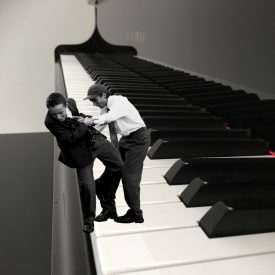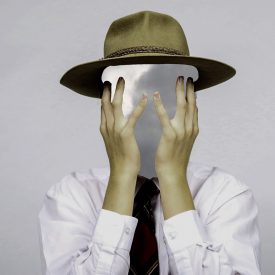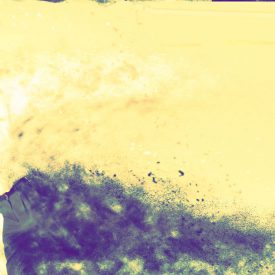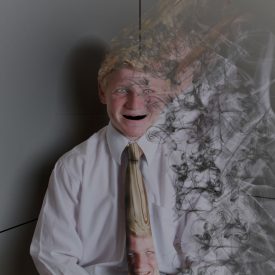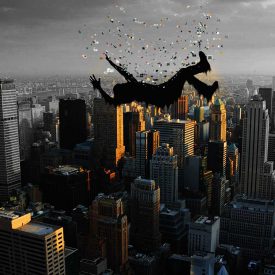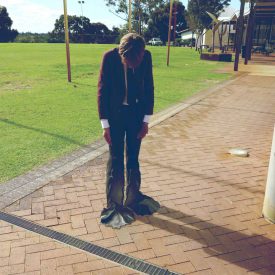Snowflakes in her Ginger Hair
Thomas Earnshaw, Year 9
I sat at the back of the train carriage with my head in my hands and the sounds of torment travelling through my weakened ears. My younger sister Mabel lay next to me grasping her teddy bear in her frail hands. The train slowly came to an end in its voyage and the guards slid open the doors forcing light upon the many eyes. Stumbling out, my boots indented the white snow beneath my feet as I helped my sister off the decaying wooden carriage. Cold winds caressed my shivering body. The guards demanded young and old to walk towards the large compound in the distance. I held my little sister as she wept in my arms. The fields surrounding the building were overgrown with dead trees and bushes, each one unique in form. The building itself was decaying as each brick was no longer its bright orange colour but tarnished brown with signs of erosion along the roof tiles. Power lines and fences entrapped the entire building. A railway ran along the frosty ground beneath us towards it, with dirty snow trapped inside the perished wooden tracks. Rubble, burnt bushes and rusty cans lay along our path. Our footsteps were loud in the barren wasteland as our group treaded across the rails. Snow began to fall and cover my sister and I with white snowflakes.
“Aaron,” whispered my sister in a soft voice.
I gazed towards her agitated eyes as she stared back at me. She lay in my arms, her ginger hair covering my sepia coat. Snow glittered over her pale face. “Where are we?” she continued.
“I don’t know, Mabel,” I explained to her as I observed our surroundings.
The group made their way towards the gate walking over the rubble and the snowed-in tracks. As we treaded across the wasteland, German guards started appearing on the roof of the building, each with guns strapped around them and the Nazi sign on the side of their sleeves. The doors swung open. We all entered not knowing what would happen.
“Heil Hitler!” yelled two officers as they came together.
The taller of them both turned to face the group. He was an old man with blue eyes and freakishly large ears. Deep wrinkles ran down his face and a jagged scar marked his left cheek. He was wearing a dark green suit with polished shoes and an arrangement of army badges on his jacket. Perhaps he was the superior officer. He glared at the crowd and patrolled along staring into the front row, turning to his coworker and whispering in his ear. They turned back to face the group and nodded to the guards surrounding us. The guards grabbed all the men and pushed them to one side.
Then they came to me. Still holding my sister, they forced me to the ground and seized my sister out of my arms. Screaming and crying, she struggled in their grasp, yelling my name and reaching for me. The men covered her open mouth and muffled her squealing. Throwing her to the ground the men behind me grabbed my shirt and hauled me up onto my feet. The guards had separated the group into two sides. On one side were men and on the other elderly women and children. I could see my sister; tears stained her cheeks and she was scratched along the palms of her hands and elbows. The guards surrounded both groups as the officers moved in front. The superior officer summoned the closest guard and whispered in his ear. The officer then turned back to face the crowd and we were escorted away, leaving my sister behind.
The group of men walked through the towering doors into a large warehouse. Inside, hundreds of young men were at hard labour, working amongst the haze of smoke rising from the raging furnaces. Each man was skinny and starving. Many were exhausted and at the edge of death. Everyone was wearing blue and white striped uniforms and each had a number on the side of their shirts. As we walked past the toiling workers many of the men didn’t look up at us but simply kept working with their greasy hands and tarnished tools. Our group stumbled through the intoxicating fumes to the other side of the building. A long table lay covered in dust with piles of uniforms lain out in disarray. The guards escorting us stood on the other side and stared into our eyes.
“Setzen die Kleidung auf!” shouted the guard on the far left of the table; his face grew red and the veins in his neck became visible.
Many of the men in our group couldn’t speak the German language and were unclear about what the enraged man had said. My father was German and had taught me some of the language. I had no idea why the man was so angered because he had simply said to put the clothes on. He furiously took out his handgun and fired a single bullet into the roof. A large sound shot through the air as small shards of dust fell from where the bullet had pierced the roof. The men working behind us didn’t react to the sound and continued working. Knowing what to do, I quickly pushed forward through the crowd to the table and took one of the uniforms. Nervously, the crowd behind me also came forward and chose a uniform. I slowly got undressed, taking off my clothes and replacing them with the striped garments. When the entire group was dressed the guards pushed us towards the work area, threw us into the lethal mist and forced us to work.
Walking out of the building my arms shivered with cold. My body yearned for nourishment and I feared starvation. I could feel my ribcage protrude out of my chest, large bags sat under my eyes. The moon had arisen and the skies were black. Lamp posts lit up the glossy snow and dirt paths. It had been almost three days since I had arrived and I hadn’t seen my sister since. I missed her familiar blue eyes and pretty ginger hair. She was all I had and I was meant to protect her. If anything was to happen to her…
Walking back to my dorm, which was at the far end of the camp, I noticed a small light in the distance behind the rusted fence. As I came up to it, I saw five men digging a large pit; each one wearing the same uniform I was wearing. They were interrupted when an officer came by. He pointed at each one of the men and then gestured at something out of sight. Each man then walked over to where the man had pointed. Observing quietly I slowly moved closer to the fence. The men came back carrying something lifeless in their arms, each one then throwing it into the pit. One man turned and faced me.
I saw the snowflakes in her ginger hair as he threw the body into the hole…


